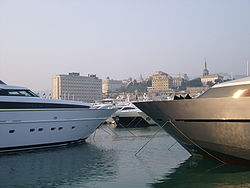Port of Genoa
| Port of Genoa Porto di Genova | |
|---|---|
 The old Lighthouse of Genoa, in Sampierdarena quarter. | |
 Click on the map for a fullscreen view | |
| Location | |
| Country | Italy |
| Location | Genoa |
| Details | |
| Opened | c. A.D. 1000 |
| Operated by | Genoa Port Authority |
| Owned by | Genoa Port Authority |
| Type of harbour | Artificial |
| Size of harbour | 500 ha (1,200 acres) |
| Land area | 700 ha (1,700 acres) |
| Size | 1,200 ha (3,000 acres) |
| Employees | 4,274 (2009)[1] |
| Statistics | |
| Vessel arrivals | |
| Annual cargo tonnage | |
| Annual container volume | |
| Annual revenue | |
| Main trades | coal, steel, oil, chemicals, food |
| Website Autorità Portuale di Genova | |

The Port of Genoa is one of the most important seaports in Italy. With a trade volume of 51.6 million tonnes, it is the busiest port of Italy after the port of Trieste by cargo tonnage.[4]
Notably the port was used for dismantling the Costa Concordia following the Costa Concordia disaster.[5]
Structural characteristics
[edit]
The Port of Genoa covers an area of about 700 hectares (1,700 acres) of land and 500 hectares (1,200 acres) on water, stretching for over 22 kilometres (14 mi) along the coastline, with 47 kilometres (29 mi) of maritime ways and 30 kilometres (19 mi) of operative quays.[6]
Passenger terminals
[edit]The quays of the passenger terminals extend over an area of 250 thousand square metres, with 5 equipped berths for cruise vessels and 13 for ferries, for an annual capacity of 4 million ferry passengers, 1.5 million cars and 250,000 trucks.[7]
The historical maritime station of Ponte dei Mille is today a technologically advanced cruise terminal, with facilities designed after the world's most modern airports, in order to ensure fast embarking and disembarking of latest generation ships carrying thousand passengers.
A third cruise terminal is currently under construction in the redesigned area of Ponte Parodi, once a quay used for grain traffic.
Lighthouses
[edit]There are two major lighthouses: the historical Lanterna, 76 metres (249 feet) tall, and the small lighthouse of Punta Vagno, at the eastern entrance of the port.[8]
Marinas
[edit]
Besides the container and the passenger terminals, the shipyards and the other industrial and cargo facilities, in the port area there are also several marinas, where many sailboats and yachts are moored.[9]
- The marina of the Exhibition centre (305 berths).
- The marina Duca degli Abruzzi, home of the Yacht Club Italiano (350 berths)
- The marina Molo Vecchio, in the area of the old harbor (160 berths for yachts up to 150 metres)
- The marina Porto antico (280 berths up to 60 metres)
- The marina Genova Aeroporto (500 berths, with new facilities for superyachts)
- The marina of Pra', in the area of the old Pra' beach, now "Fascia di Rispetto di Pra'" (1000 berths)
References
[edit]- ^ "Employment trends in the Port of Genoa, 2001-2009" (PDF). Genoa Port Authority. Retrieved 4 August 2012.[dead link]
- ^ a b c "Genoa Port Yearbook 2012". Genoa Port Authority. Retrieved 19 November 2013.
- ^ "Genoa Port 2012 budget" (PDF). Retrieved 4 August 2012.[permanent dead link]
- ^ "Top 100 ports 2013". Lloyd's List. 29 August 2013. Archived from the original on 9 March 2014. Retrieved 19 November 2013.
- ^ "Costa Concordia makes final voyage to its scrapyard grave". 24 July 2014. Archived from the original on 3 August 2014. Retrieved 30 July 2014.
- ^ "Genoa Port energetic and environmental plan" (PDF). Genoa Port Authority. Retrieved 4 August 2012.
- ^ "Autorità Portuale di Genova - Passeggeri". Porto.genova.it. Archived from the original on 2009-06-08. Retrieved 2008-12-26.
- ^ Rowlett, Russ. "Lighthouses of Italy: Liguria". The Lighthouse Directory. University of North Carolina at Chapel Hill. Retrieved 2008-12-26.
- ^ Paolo Ciraci. "Pagine Azzurre Online - Ports and Marinas in Liguria, Chart 3". Pagineazzurre.com. Archived from the original on 2012-04-08. Retrieved 2008-12-26.
